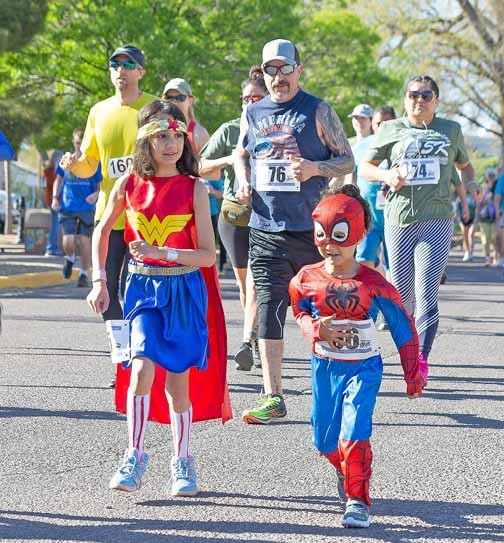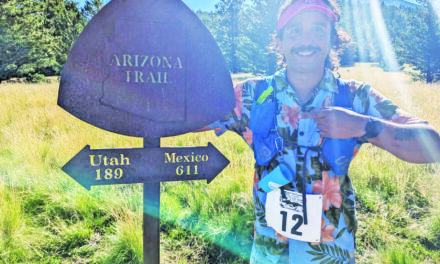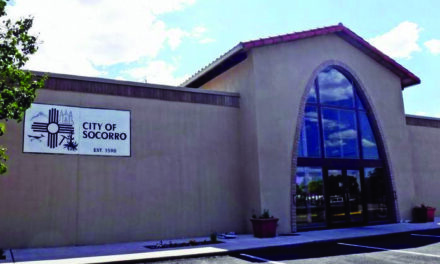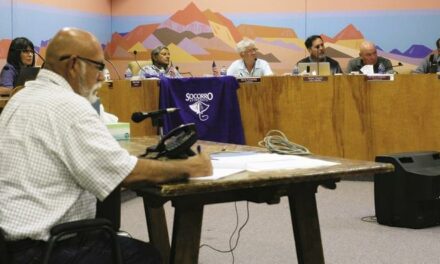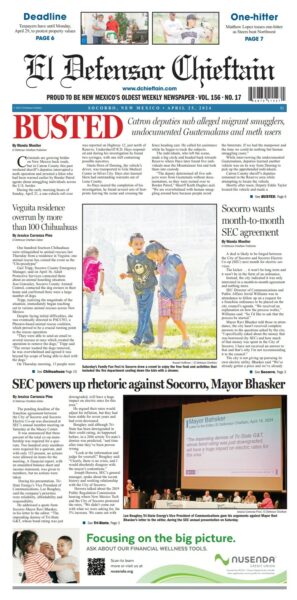An estimated 200 runners participated in the Conner’s Causes 5K/1-mile walk in Socorro on Saturday, raising more than $4,000 for the Cystic Fibrosis Foundation.
“We had a great turn out. We are waiting on numbers from a few groups who walked yesterday, but it looks like around 200 people participated,” Jeannie Johnston said via the Connor’s Causes Facebook page on Sunday.
Started as the brainchild of six-year-old Connor Johnston eight years ago, Connor’s Causes has grown gradually over the years, with Connor’s mother, Jeannie, spearheading the operation and handling the logistics behind the scenes. Last year there were 185 runners, and 160 people took part, the year before.
This year, things were a little different. Connor stepped up to the microphone as the master of ceremonies for the first time, and it was an opportunity for participants to learn about his struggles first-hand.
Johnston takes several different treatments for CF and the various ailments that come with it.
“Sometimes I have to go to the hospital for what’s called a CF tune-up because my lung function is down, and I can’t breathe when my lung function is down. I was born with CF. I was diagnosed at 10 months old,” Johnston said. “About five years ago, a modulator called Tri-Factor was developed, which helps about 90 percent of patients with CF.”
Unfortunately for Johnston, the new CF breakthrough won’t help him because he suffers from the rarest of the rare forms of CF mutations.
“Only 20 people in the world have the same CF mutation I have,” Johnston said.
Nonetheless, Johnston doesn’t let CF keep him down. He plays soccer and swims for Socorro High School. He’s run track in the past and, after running the mile portion of the event, might consider it again if his health allows it.
Johnston’s also blossomed over the last year and overcame shyness to step up and explain why he’s gone from a kid hoping for cupcakes at the end of an event to an active participant in recruiting sponsors and runners. He even got his University of New Mexico Hospital treatment team to participate this year.
While Connor’s Causes is a charity event, some competitive juices were still flowing among the runners, including those hoping to take down multiple-time champion and high school cross country coach Beth Cadol.

“You know I love it when one of my runners beats me,” Cadol said.
It’s a worthwhile accomplishment for Montoya, considering he’s only the second runner to beat his coach.
Magdalena’s Julien Carranza Negrete, 12, decided to run the one-mile walk and caught the coach’s attention with an 8:47 time.
“I want to say thank you to our sponsors. I want to say thank you to our volunteers. Thanks for all your hard work in making this happen. We appreciate all your help. It means a lot. Thank you for helping raise funds to help find a cure for CF,” Johnston said. “Last but not least. A huge thank you to my mom. She’s the brains behind this operation.”
Next year’s Connor’s Causes takes place during May.
“We’re moving it to May because May is Cystic Fibrosis Month,” Jeannie Johnston said.
The signs of CF Cystic fibrosis (CF) is a genetic disorder that can cause severe damage to the lungs, digestive system, and other organs.
CF affects the cells responsible for producing mucus, sweat, and digestive juices. Usually, these fluids are thin and slippery, but in people with CF, a defective gene causes the secretions to become sticky and thick. This leads to blockages in tubes, ducts, and passageways, particularly in the lungs and pancreas.
While CF is a progressive disease that requires daily care, people with CF can usually attend school and work. Improvements in screening and treatments mean that people with CF now have a higher quality of life, and may live into their mid-30s, 40s, or even their 50s.
In the U.S., newborn screening can help diagnose CF within the first month of life before symptoms develop. However, people who were born before newborn screening became available may not be diagnosed until symptoms start to appear. Signs and symptoms of CF can vary, depending on the severity of the disease. Even within the same person, symptoms may worsen or improve over time.
Some people may not experience symptoms until their teenage years or adulthood. People who are not diagnosed until adulthood usually have milder disease and may experience atypical symptoms, such as recurring bouts of pancreatitis, infertility, and recurring pneumonia.
People with CF tend to have a higher-than-normal level of salt in their sweat, which can be tasted by parents when they kiss their children. Most of the other signs and symptoms of CF affect the respiratory and digestive systems. Respiratory signs and symptoms may include a persistent cough that produces thick mucus, wheezing, exercise intolerance, repeated lung infections, inflamed nasal passages, or recurrent sinusitis.
Digestive signs and symptoms may include foul-smelling, greasy stools, poor weight gain and growth, intestinal blockage (particularly in newborns), or chronic or severe constipation.
If you or your child has symptoms of CF, or if someone in your family has CF, talk to your doctor about testing for the disease. Cystic fibrosis requires regular follow-up with your doctor, at least every three months.
Contact your doctor if you experience new or worsening symptoms, such as more mucus than usual or a change in the color of your mucus, lack of energy, weight loss, or severe constipation. If you are coughing up blood, have chest pain or difficulty breathing, or have severe stomach pain and distention, seek immediate medical care.
